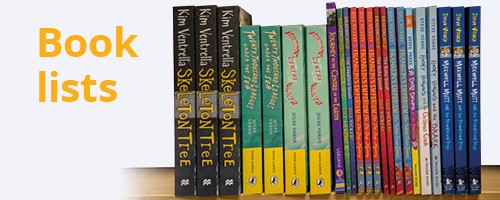For help, advice and telephone ordering call our team on 0121 666 6646
Are you sure you wish to delete this basket?()
This action cannot be undone.
Sorry, something went wrong
Please report the problem here.
Branching Out With Books for Topics: how to move readers on from a particular series or author

January 29th 2023
 |
Guest blogger: Alison Leach Alison Leach is the founder of BooksForTopics, a website that helps schools find great books to enrich their curriculums and promote reading for pleasure. As an experienced primary teacher, Alison knows that it is not always easy to source the right books and she is passionate about helping the best books reach the spotlight. You can follow @booksfortopics on Twitter. |
Being able to recommend books to pupils is key to a school librarian or teacher's role, but with so many books and so little time, it can be difficult to know where to start. That's why Books For Topics' popular Branching Out packs are an effective and time-saving option. Each of the handy book packs for schools contains a selection of books that have been expertly curated within the reading schemes to help primary school children to discover reading for pleasure, find their new favourite authors, and diversify their reading. Alison Leach, founder of BooksForTopics, took over our blog to explain how they can benefit your classrooms and libraries.
Sparking a lifelong love of reading for pleasure
We’ve all encountered readers who have fallen in love with a series and just want to stick to it. It’s no bad thing – in fact, a single series or author’s collection can often be the very spark that begins a lifelong love of reading. Nonetheless, it sometimes becomes difficult for young readers to know where to go next once they’ve exhausted their collection. It’s a bit like when we finish a Netflix series and don’t feel like starting anything new because it feels as if nothing can fill the void in quite the same way.
Teachers and librarians are usually called upon to help with the process of moving readers onto something new. A quick scan through #TeacherTwitter or parenting Facebook groups will quickly bring up a myriad of similar questions: 'Can you recommend a book for fans of Wimpy Kid?’, or ‘My daughter only reads Roald Dahl books - what else can I give her?’, or ‘How can I move my child on from Rainbow Magic?’. Sometimes this is because children have finished a series and don’t know what to try next, or because children are reluctant to step away from a tried-and-tested author they like, or because teachers and parents feel that a broader or more diverse selection would be beneficial.
What does Branching Out offer?
Our Branching Out posters and booklists are designed to offer similar suggestions to the popular books and series that readers tend to get stuck on. Using our lists, fans of Tom Gates are gently pointed towards Planet Stan or The Day the Screens Went Blank, whereas die-hard Harry Potter readers may enjoy the suggestion of Amari and the Night Brothers or Nevermoor. Schools can also purchase the full Branching Out packs through Peters.
Selecting books for these lists is always a joy. It’s also a responsibility, because if there is a level of reluctance to move on from a series, it’s important to have very well-picked options available. As many teachers and librarians know, when you do succeed in moving a reader happily on, it’s a bit like solving a puzzle; it’s fun to work on finding the solution, and the satisfaction of completing the task is unmatchable.
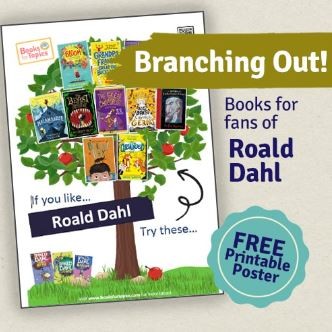 |
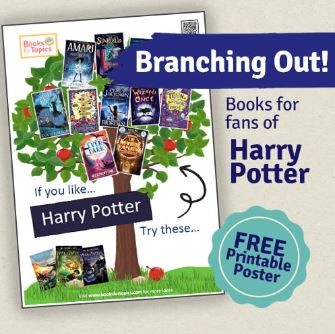 |
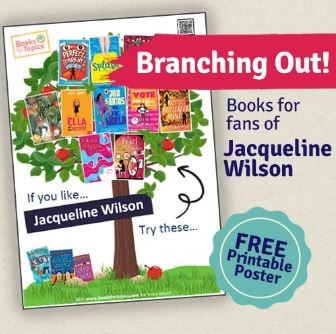 |
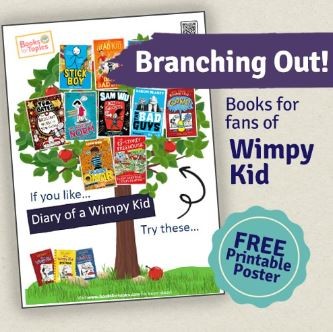 |
DISCOVER ALL BRANCHING OUT PACKS
Four factors to consider
1. Identify the sticking factor
What matters the most when finding recommendations that are similar to a beloved series is identifying the ‘sticking factors’: what exactly it is about the series that has caused the reader to become hooked. Two different readers who love the same series may find different sticking factors. For example, one child who loves The Worst Witch might be drawn to stories of magic (in which case we might suggest Starfell next), another might love the boarding school element (they might like to try Malory Towers) and another still might be drawn to a collectable series with an adventure-loving female lead (try Pages and Co). For teachers and parents, taking time to discuss with children what it is that they love about the series in question can help to hone the recommendations for what to try next. When we select the 10 books in each of our Branching Out lists, we try to cover different likely sticking factors for each series.
2. Match the reading level
Sometimes readers fall in love with a series because it is, development-wise, just the right thing at the right time. I’ve lost count of the number of children I’ve taught who fell in love with Rainbow Magic or Horrid Henry because the series was their first foray into independent chapter books. Perhaps they loved the stories, but sometimes it was independent reading itself that they fell in love with. Recommendations of similar series need to take into account the reading level to be matched, in terms of word count, illustration level, vocabulary style and accessibility.
3. Diversify the options
One of the consequences of becoming stuck on a much-loved series or author is that it narrows the scope of reading. When we select our Branching Out lists, we consider a diverse range of options in terms of characters and family settings in our books for topics. Fans of Diary of a Wimpy Kid, for example, might enjoy a similar style of story that explores Sam Wu’s Chinese heritage or the portrayal of life in a British Muslim family of Pakistani heritage in the Planet Omar series. Equally, fans of Jacqueline Wilson may enjoy a similar style of true-to-life stories that sees life through the eyes of a neurodiverse character, such as A Kind of Spark or The Boy with the Butterfly Mind.
4. Find genuinely good books
This one should go without saying, but we only select books that our review panel of teachers, librarians and children’s book experts has loved and thoroughly recommended. Fans of Beast Quest could easily search the internet for a database of books containing monsters or action, but a tried-and-tested recommendation that young readers are likely to really love simply can’t be beaten.
How teachers are enjoying Branching Out with Books for Topics!
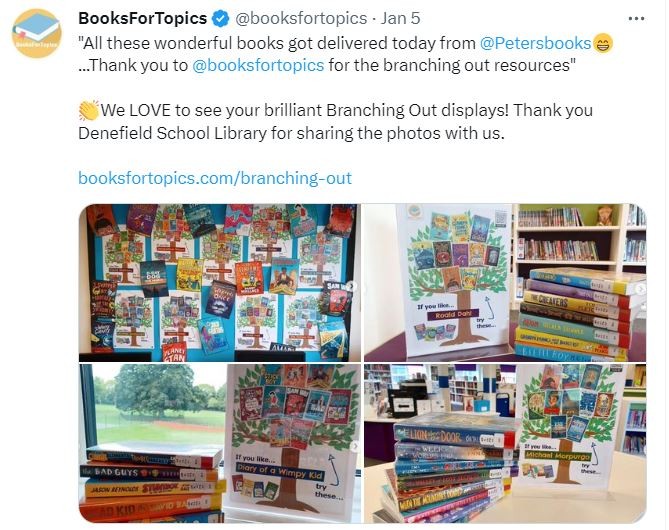 |
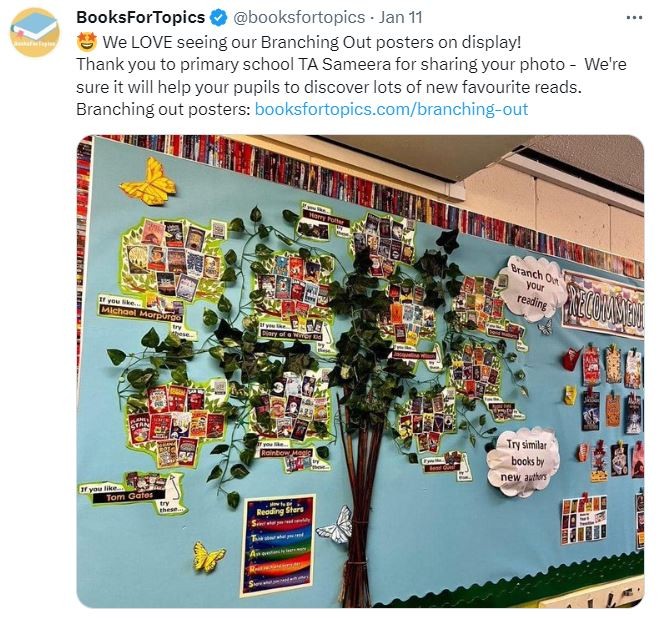 |
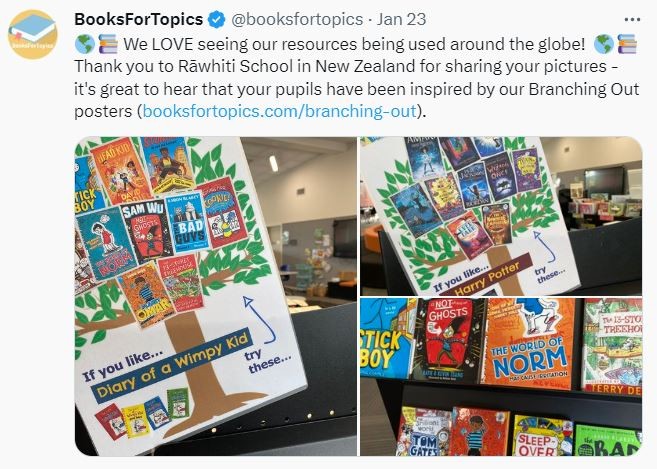 |
📚 READ NEXT: WHY NON-FICTION CAN BE JUST AS MUCH FUN AS COMIC BOOKS





